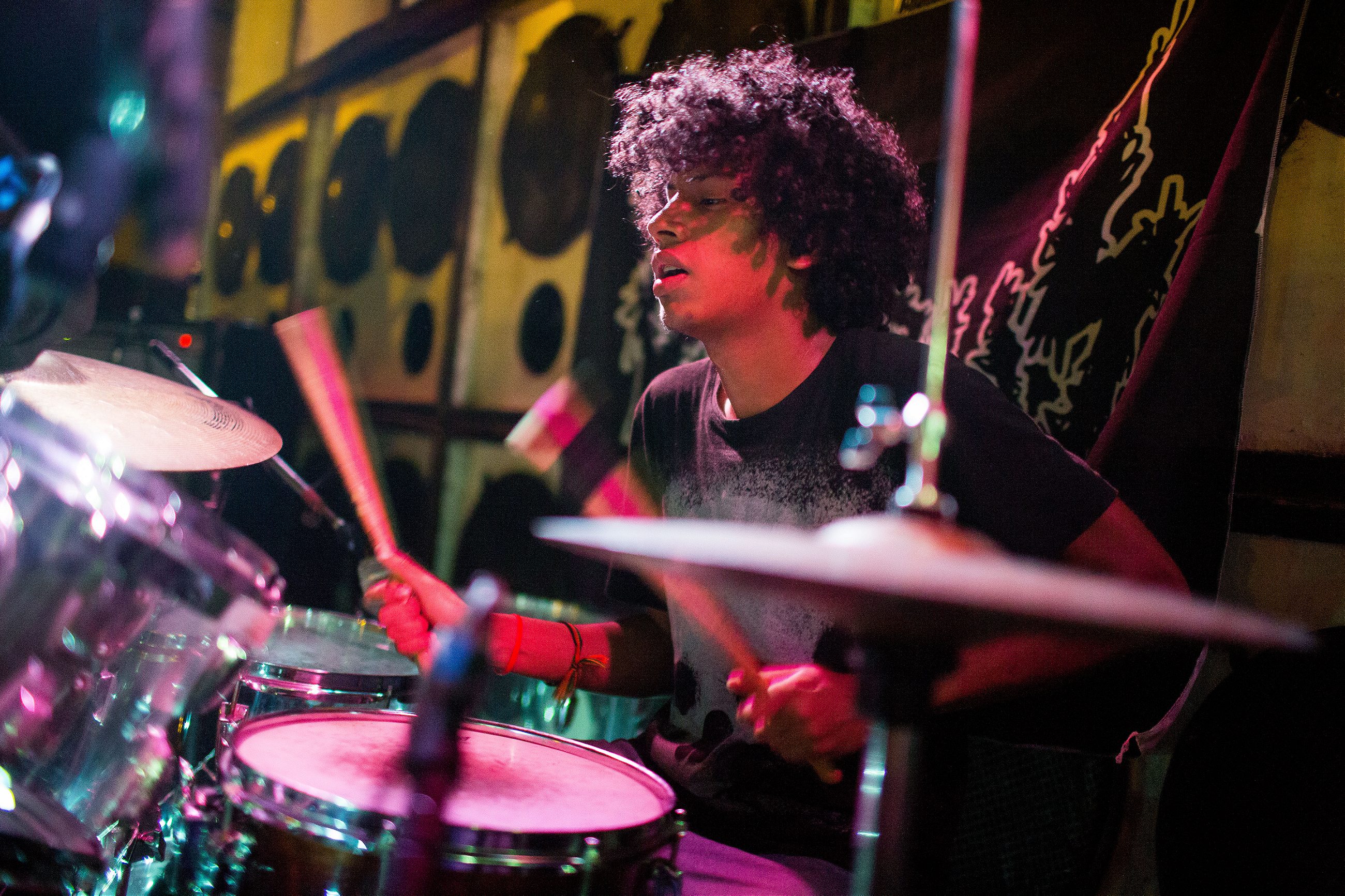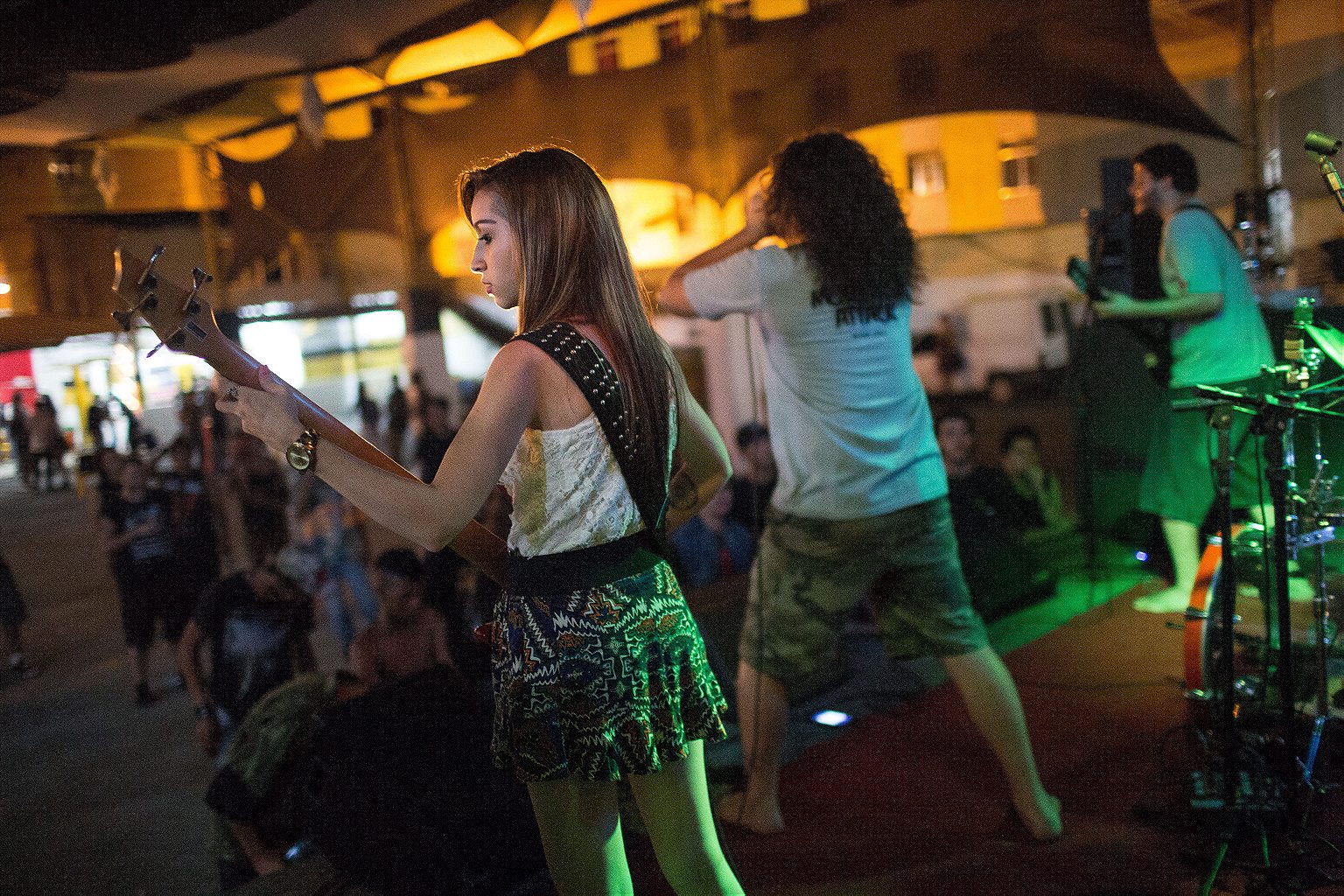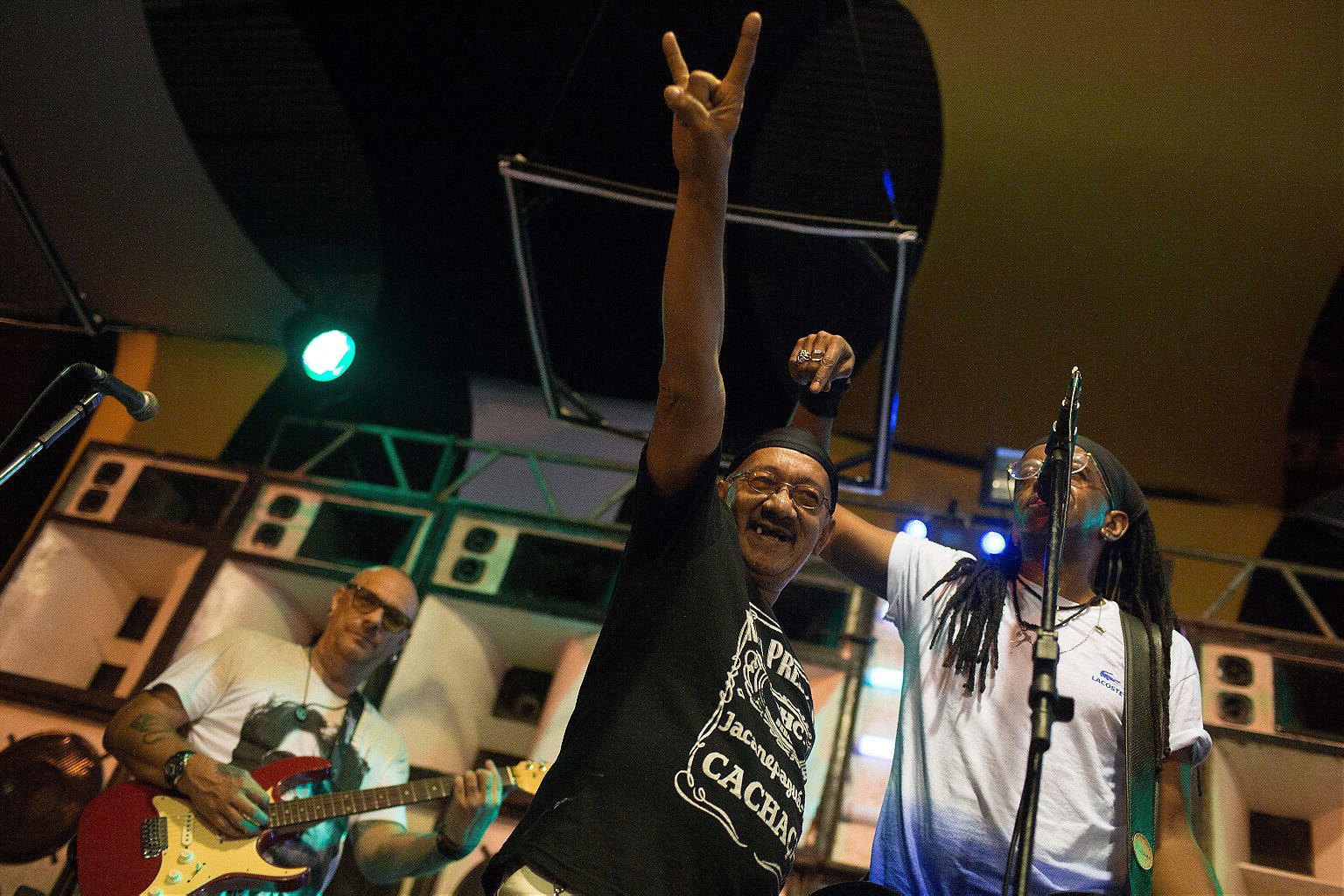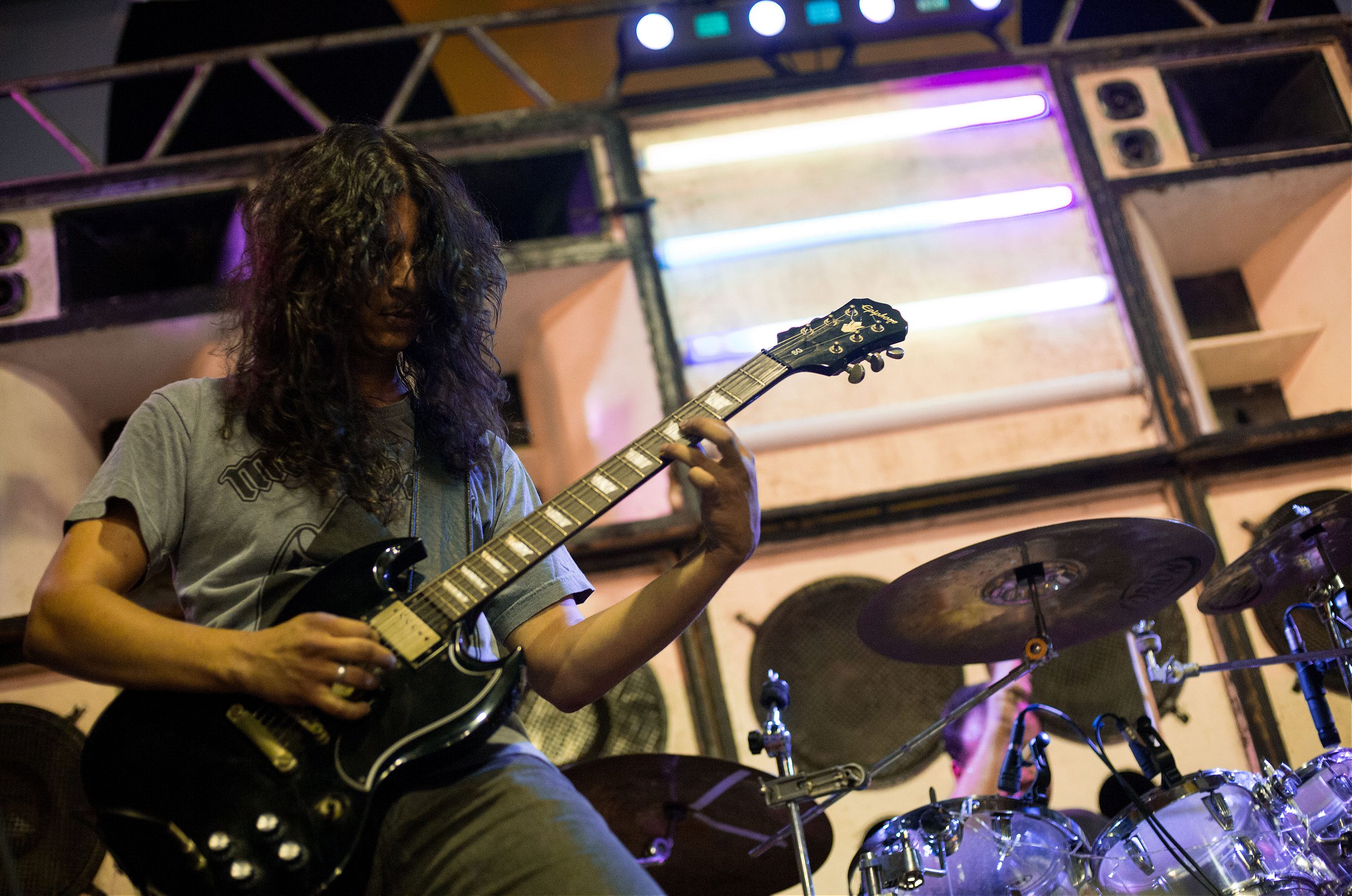A rock scene rises in the home of baile funk and samba.
No one watching the student show in Augusto Magnar School had ever heard of Slipknot. The primary school is in Cidade de Deus, the Rio de Janeiro slum made infamous by the Oscar-nominated film ‘City of God.’ It was the late 2000s, and although the American band had been making headlines for some time, for the favela residents heavy metal was uncharted territory.
So when 10-year-old Mateus Menezes stepped onto the stage for his performance wearing a cardboard cutout of one of Slipknot’s trademark masks, the audience of parents and teachers were shocked. He mimed the song ‘Before I Forget’ to the audience with a fake electric guitar in his hands and stepped off the stage.
He had officially become the ‘maluco do rock,’ crazy rock fan, as his neighbors call him. “I was a laughing stock in school,” Mateus recalls. His long hair, in stark contrast to the close cut styles prevalent in the favela, also marked him out, he confesses.
Now Mateus is 17, and tonight he has to step on to another stage. He is the drummer in a band called Oxiürus, and they play grind core and crossover rock music. They have been playing together for a year, but this show is special. The venue where they are performing is only a 15-minute walk from the school where he stunned his classmates all those years ago. This is the first time he is playing in Cidade de Deus, more commonly known as CDD to local residents.
The underground rock movement in Rio’s favelas has been attracting more and more young people like Menezes in the last few years. Tonight he is playing in CDD Rock Baile, one of the best established rock events in favelas. There are dozens of others, sometimes attracting close to a thousand people in one night.

Some say the genre’s growth in popularity is related to the success of Rock in Rio, a large music festival that has been mobilizing the city every two years since 2011. Others say young people growing up in poor communities in Rio have every reason to find rock’s rebellious style appealing. Oxiürus’s songs are full of lyrics protesting against violence and prejudice.
According to Mateus though, this is merely a consequence of young kids being exposed to an increasing flow of information. “People now have more access to different music through the Internet,” he says. More than 80% of young people in favelas across Brazil have regular Internet access, according to a recent survey. Mateus says he doesn’t feel like a weirdo anymore: “Lately, I have been seeing a bunch of people with band t-shirts and colorful hair around here.”
Mateus’s generation was also inspired by local rock pioneers. During the 1980s and the 1990s a handful of Brazilian rock bands were starting to grab headlines. But back then it wasn’t as easy for a kid to look up a band and listen to their songs.
Gustavo Pereira, Mateus’s father, is 44 years old. He also grew up in a favela in Rio, and is a die hard rock fan. He remembers falling in love with rock music the first time Kiss came to Brazil, in 1983.
“I didn’t know how to absorb it,” he says. It was hard for him find out more about rock in those days. This was about ten years before there was a dedicated rock radio station in Rio. Sometimes Gustavo caught some Black Sabbath video clips on TV, but that was about it. “I remember I made a pretend electric guitar out of left over wood, attached a few nylon strings and dreamed about it.”
His son, on the other hand, had access to real electric guitars from an early age. Mateus taught himself to play, watching other people and listening closely to his favorite songs. He doesn’t have a drum set at home, but that’s just because his family doesn’t want to give the downstairs neighbors headaches. “I practice in the wind,” Mateus says moving his hands as if they were drumsticks.

CDD Rock Baile was named after Cidade de Deus, and the party for which this favela is most famous: the baile funk. Funk is a Miami Bass inspired musical movement that began in Rio’s favelas in the 1980s. With lyrics full of explicit sexual descriptions, funk quickly became the most well-established music style in the favelas–rivaling samba, which was born in the same communities. The favela drug gangs soon dominated the baile funk scene and organized parties where large quantities of their product were sold.
Then in 2009, a police unit was installed in Cidade de Deus in an attempt to put a stop to the violence. The drug gangs are not as powerful as they were when the movie ‘City of God’ brought the problem to a global audience. However, the problem is far from gone. A few weeks ago Gustavo woke up to find a dozen bullet holes in his car.
Since the police settled in the favela, the community’s music scene has changed. Funk parties are not allowed to run past midnight, a rule that has been subject to much protest. The rock parties, however, can go on as late as their organizers choose.
Back at CDD Rock Baile, as the staff run through the sound-check, they can hear the faint sound of funk playing nearby. There’s a massive sound system, a trademark of baile funk, against the back wall of the stage where the CDD Rock Baile will take place. It’s a reminder that the rock fans are visitors here.
The venue, on a hilly road just off one of the main squares in the favela, is itself dedicated to an entirely different style of music: samba. The Coroado Court is the headquarters of Cidade de Deus’s samba school. This is where crowds of sambistas have trained for the Rio carnival for the past 43 years.
“This is rock’s night!” screams a grey haired man as he drinks a can of beer and watches the final preparations for the concert. Sixty-four-year-old Manuel Severino de Jesus – or just Deda – wears a local band t-shirt and a black bandana. Deda has been the Coroado Court’s director for the last 42 years. He is a sambista, one of the people who work year-round to make the big carnival parade happen. “I’m a rock fan in my free time,” he says with a big laugh.

Deda usually stays away from the baile funk parties that bring thousands of people to his venue. “I don’t like funk, but it pays for carnival,” he says. The CDD Rock Baile, on the other hand, commands his full attention – although it doesn’t bring much profit. “I like it because it attracts a different kind of crowd, that wouldn’t usually come here.”
Murilo Freitas created CDD Rock Baile. Everyone calls him Sinatra (I was never able to discover why.) If there is one thing he despises, he says, it’s “cheesy samba and pornographic funk.”
Sinatra, 49, is a taxi driver. He moved to Cidade de Deus when he was 11 and has lived there ever since. He decided to create a rock event in Cidade de Deus ten years ago. He started small: “He would put a bunch of bands to play to three or four people,” says MV Bill, one of Brazil’s best-known rappers and a resident of Cidade de Deus.
Mateus and his father were members of that tiny audience. “I was there since the first edition,” Mateus boasts. Five years ago, Sinatra’s event got bigger and moved to the samba court, where bands got a proper stage, and space for hundreds of rock fans. Sometimes, three hundred people show up.
Tonight, Sinatra is nervous, pacing up and down. “You never know what’s going to happen. Sometimes everyone comes, sometimes no one comes,” he says. Eventually, one hundred and fifty fans turn up to watch Oxiürus and three other bands play.

Mateus is one of the reasons Sinatra organizes this show. “What I do is philanthropic. I love rock ‘n’ roll,” he says. He never made one cent from the event. The whole point, he says, is to provide a space for rock bands to play – so he was never bothered by the sparse audience. “There are many bands that got together because of the event,” says Sinatra.
Back when the CDD Rock Baile was still a street party, Sinatra called MV Bill over and told him that he should play with the bands, add some rap to the rock. Bill didn’t have a band, but Sinatra, stubborn as ever, insisted. He found a couple of guys he thought would match Bill’s style. They played for the first time ever at Sinatra’s event. “It rocked,” Bill says.
The musicians got along so well they decided to record an album. The album, called ‘Despacho Urbano’ (Urban Dispatch) won critical acclaim. In 2007, MV Bill and his rock band played at the Live Earth festival in Rio de Janeiro. The whole endeavor was propelled by the ever-stubborn Sinatra. “The whole world saw them,” he says. “I got really emotional. I cried my fucking eyes out.”
At 11pm, as the music starts playing, more and more young kids dressed in black, gather in the samba court, watched by a few bemused neighbors. Since there is no entrance fee, some come in to check it out. Three teenage girls in tight colorful shorts and tank tops giggle as they mimic a musician head-banging on stage. Alexandre da Silva, a 38-year-old builder, looked mesmerized as he leaned on a pillar to watch the bands play. “I have nothing against it,” was the nicest thing he was able to muster.
PEOPLE IN FAVELAS SEEM TO THINK ROCK IS NOISY AND THAT ITS FANS ARE DRUG ADDICTS
Most of the people in the crowd live in the poor communities around Cidade de Deus, and find the CDD Rock Baile a welcome change from the dominant samba and funk scenes. “This is my breathing space,” says 23-year-old Wallace Sartori. His friend Lucas Marques, an 18-year-old student, says: “People here are too closed minded.”
They complain that people in favelas seem to think rock is noisy and that its fans are drug addicts. “There is a lot of prejudice,” says Lucas. A few years ago, when a Rock in Rio concert was projected onto a big screen in Cidade de Deus, there was a big fight between funk fans and rock fans during Slipknot’s concert. “They had to turn the screen off,” Lucas recalls.
It was way past midnight when Mateus disappeared behind the drum set on the stage and Oxiürus started playing. Young kids danced, slamming their bodies against each other. Alexandre, the builder, nodded his head gently. The walls between the different cultures didn’t look so high now.
Oxiürus finished its set to rapturous applause. Some people commented it was the best band that night. Sinatra looked happily drunk watching it all happen: “I do this so people can see something different to what they are used to,” he says. “Maybe funk fans can become rock fans. It’s rare, but it happens.”
Mauro Pimentel is a freelance photographer – and drummer – based in Rio de Janeiro. His work has been published in El País, the Associated Press, Folha de S. Paulo, Veja magazine and UOL